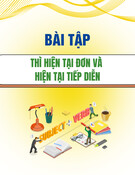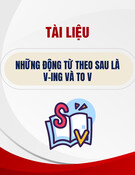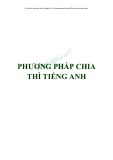
LUY N T P THÌỆ Ậ
QUÁ KH ĐNỨ Ơ
H c viên:ọ
A. Luy n t p ng phápệ ậ ữ
Bài 1: Hoàn thành câu sau đúng d ng thì quá kh đn :ạ ứ ơ
1. It/ be/ cloudy/ yesterday.
2. In 1990/ we/ move/ to another city.
3. When/ you/ get/ the first gift?
4. She/ not/ go/ to the church/ five days ago.
5. How/ be/ he/ yesterday?
6. Mr and Mrs. James/ come back home/ and/ have/ lunch/ late/ last night?
7. They/ happy/ last holiday ?
8. How/ you/ get there?
9. I/ play/ football/ last/ Sunday.
10. My/ mother/ make/ two/ cake/ four/ day/ ago.
11. Tyler/ visit/ his/ grandmother/ last/ month.
12. Joni/ go/ zoo/ five/ day/ ago.
13. We/ have/ fun/ yesterday.
14. My/ father/ not/ at the office/ the day/ before yesterday.
Bài 2: L a ch n và đi n d ng đúng c a t :ự ọ ề ạ ủ ừ
teach cook want spend ring
be sleep study go write
1. She…..out with her boyfriend last night.
2. Laura…..a meal yesterday afternoon.
3. Mozart…..more than 600 pieces of music.
4. I…..tired when I came home.

5. The bed was very comfortable so they…..very well.
6. Jamie passed the exam because he…..very hard.
7. My father…..the teenagers to drive when he was alive.
8. Dave…..to make a fire but there was no wood.
9. The little boy…..hours in his room making his toys.
10. The telephone…..several times and then stopped before I could answer it.
Bài 3: Chia đng trong ngo c đúng d ng thì quá kh đn :ộ ặ ạ ứ ơ
Snow White was the daughter of a beautiful queen, who died when the girl (be)1……….. young. Her father
(marry)2………….again, but the girl’s stepmother was very jealous of her because she was so beautiful. The evil queen
(order)3………….a hunter to kill Snow White but he couldn’t do it because she was so lovely. He (chase)4………….her
away instead, and she (take)5………….refuge with seven dwarfs in their house in the forest. She (live)6………….with
the dwarfs and took care of them and they (love)7………….her dearly. Then one day the talking mirror
(tell)8………….the evil queen that Snow White was still alive. She (change)9………….herself into a witch and
(make)10………….a poisoned apple. She (go)11………….to the dwarfs’ house disguised as an old woman and tempted
Snow White to eat the poisoned apple, which (put)12………….her into an everlasting sleep. Finally, a prince
(find)13………….her in the glass coffin where the dwarfs had put her and woke her up with a kiss. Snow White and the
prince (be)14………….married and lived happily ever after.
Bài 4: Chuy n nh ng đng t b t quy t c sau sang d ng quá kh :ể ữ ộ ừ ấ ắ ạ ứ
1. Be
2. Become
3. Begin
4. Break
5. Bring
6. Build
7. Buy
8. Choose
9. Come
10. Cost
11. Cut
12. Do
13. Dream

14. Drink
15. Eat
16. Feel
17. Find
18. Forget
19. Get
20. Give
B. Đc- hi u:ọ ể
VI T NAM CIVIL WARỆ
In 1429, king Lê Thái Tổ issued a royal proclamation that if he’s dead, his first child whose name is Lê T T ư ề
would be the next king of Đi Vi t. ạ ệ
Furthermore, He explained himself to other officers: “Once I am dead, Lê T T will be promoted into king ư ề
position and Lê Nguyên Long will be his brother’s successor”.
However, Lê Nguyên Long did not accept this decision of his own father. He induced two very important officers
(Lê Sát and Lê Khôi) to topple his brother. They forced Ph m Văn X o, Tr n Nguyên Hãn (close supporters of ạ ả ầ

Lê T T ) to die unjustifiably, then these guys accused falsely king Lê T T of insane, lustful and murdering ư ề ư ề
his own concubines for no reason.
In 1433, king Lê T T was deposed, then Lê Nguyên Long put his brother under house arrest , Lê T T was ư ề ư ề
dead soon later in silent and deeply resentment. Very soon then, Lê Nguyên Long was promoted into king
position, his title is Lê Thái Tông.
Actually, this is the beginning of Lê dynasty’s civil war because Lê Thái Tông was a bad example for his own
children.
In 1442, after visiting the L Chi Viên litchi farm which is belong to officer Nguy n Trãi, king ệ ễ Lê Thái Tông
was dead suddenly at age 20. The court accused Nguy n Trãi of murdering the king and executed all three ễ
generations of this officer’s family. This case was named “L Chi Viên mysterious”. ệ
After the king’s death, Lê Bang C was promoted to be the successor (title ơLê Nhân Tông) although he was just
a kid at that time. However, thanks to his mother and other officers’ support, he soon became a clear-sighted
king and helped the country to develop amazingly.
Unfortunately, in 1459, Lê Thái Tông’s first kid – Lê Nghi Dân came back from L ng S n and sent assassin to ạ ơ
imperial palace. This assassin murdered both king Lê Nhân Tông and his mother.
Some historians claimed that Lê Nghi Dân is not Lê Thái Tông’s true blood, they believe very strongly that this
guy was the result of his mother’s stealthy relationship.
On Jul 10th 1459, Lê Nghi Dân declared to be the new king, called himself Thiên H ng. ưIn the time he was in
charge, Thiên H ngư replaced all the important officers by his loyal allies. Some people who tried to kick him
down was murdered all.
In June 1460, Nguy n Xí, Đinh Li t, Lê Lăng, Lê Ni m, Lê Nhân Quý, Tr nh Văn Sái, Nguy n Đc Trung ễ ệ ệ ị ễ ứ
cooperated to mutinied and they were success in deposing Thiên H ng. ưThis transient king was garotted very
soon then, he was 22 years old at that period.
On June 6th 1460, Nguy n Xí, Đinh Li t, Nguy n Đc Trung were unanimous in proposing Lê T Thành to be ễ ệ ễ ứ ư
the new king (title Lê Thánh Tông). Đi Vi t stepped in a period of peace and prosperity.ạ ệ

C. Bài t p nói:ậ
Hãy k v m t k ni m khó quên trong cu c s ng c a b n.ể ề ộ ỷ ệ ộ ố ủ ạ
Có th b t đu b ng: ể ắ ầ ằ Today, I want to tell you one of my most unforgetable memory….
K t thúc b ng: ế ằ To cut off a very long story, I want to say that………..
BÀI GI IẢ
Bài 1:
1. It was cloudy yesterday.
2. In 1990, we moved to another city.|In 1990 we moved to another city.
3. When did you get the first gift?
4. She did not go to the church five days ago.|She didn’t go to the church five days ago.
5. How was he yesterday?
6. Did Mr. and Mrs. James come back home and have lunch late last night?
7. Were they happy last holiday?
8. How did you get there?
9. I played football last Sunday.
10. My mother made two cakes four days ago.
11. Tyler visited his grandmother last month.
12. Joni went to the zoo five days ago.
13. We had fun yesterday.
14. My father was not at the office the day before yesterday.|My father wasn’t at the office the day before yesterday.
Bài 2:
1. went
2. cooked
3. wrote

![Ôn tập các thì trong tiếng Anh [chuẩn nhất]](https://cdn.tailieu.vn/images/document/thumbnail/2019/20190920/vuvan153/135x160/1989489814.jpg)






![Các thì tiếng Anh thông dụng [2024]: Tổng hợp đầy đủ nhất](https://cdn.tailieu.vn/images/document/thumbnail/2016/20160527/thongnguyentrung/135x160/541885747.jpg)



![Bài tập thì hiện tại hoàn thành [kèm đáp án chi tiết]](https://cdn.tailieu.vn/images/document/thumbnail/2025/20251106/thuthao27062004/135x160/41601762420911.jpg)






![Tài liệu ôn tập Ngữ pháp tiếng Anh [chuẩn/mới nhất/tổng hợp]](https://cdn.tailieu.vn/images/document/thumbnail/2025/20250821/vuongdinhlinh1412@gmail.com/135x160/933_tai-lieu-on-tap-ngu-phap-tieng-anh.jpg)

![Bài tập so sánh hơn và so sánh nhất của tính từ [kèm đáp án/mới nhất]](https://cdn.tailieu.vn/images/document/thumbnail/2025/20250808/nhatlinhluong27@gmail.com/135x160/77671754900604.jpg)




